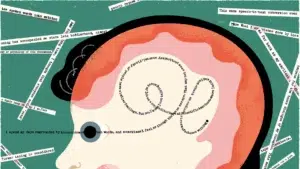I see the words people say. When someone speaks – and especially when I am speaking – I see the words being spoken like closed captioning.
For a long time, I thought everyone did this.
Then, one day, I asked a colleague if she was as annoyed as me by an administrator’s speech pattern. The administrator in question tended to stop midsentence and begin a new sentence, making her words appear jumbled and filled with ellipses and em-dashes in my mind.
Punctuation can be difficult if people constantly stop midsentence to begin a new idea.
I explained this to my colleague, who thought I was crazy.
“You see her words? What are you talking about?”
Then I checked with others, and they thought I was crazy, too. No one saw the words being spoken like closed captioning.
I couldn’t believe it.
Then, a few years later, I found someone who does. He sees the words being spoken just like me.
I was so excited. I was no longer a lone loon.
Then I discovered that it has a name.
“Ticker tape synesthesia” is the automatic and involuntary visualization of words that appear like subtitles when listening, speaking, or thinking. Scientists speculate that tickertaping derives from atypical brain functioning akin to dyslexia.
TTS was first reported in 1883 by Francis Galton, Darwin’s polymath half-cousin, who stated that “some few persons see mentally in print every word that is uttered, and they read them off usually as from a long imaginary strip of paper, such as is unwound from telegraphic instruments.”
That’s not exactly how I see the words people speak, but it’s close.
Ticker tape synesthesia is rare. It seems to have a slight propensity to run in families. It doesn’t hinder a person in any way except those with difficulty focusing in a room full of speakers.
Happily, this is not a problem for me. Though it requires no effort to see the words being spoken (or, as Charlie recently pointed out, being sung, too), I can sort of push them away a bit, too, when desired. Move them into the background. I can still see them, but they can be made less prominent. Also. when I focused on another task, like driving, they tend to move into the background on their own.
TTS has no discernible advantages that I can see, and scientists have found none, so it’s just something I do, absent any meaningful impact on my life.
A superpower of sorts without any actual use.
Figures.
Except it made me feel a little odd for a long time. Different from humanity and curious about why I do something that no one else seemingly did.
Happily, that is no longer the case. As rare as TTS may be, fellow captioners exist. I’m no longer a singular oddball.
Admittedly, even this wasn’t much of a problem since my real superpower is a general lack of concern over what others think of me.







